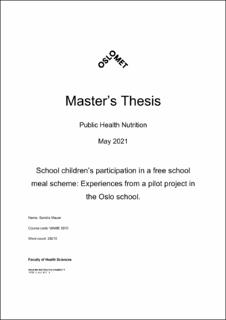School children’s participation in a free school meal scheme: Experiences from a pilot project in the Oslo school.
Abstract
ntroduction: The City Council of Oslo has decided to introduce a free school meal for pupils in the Oslo School. In preparation for this, three schools in the Municipality of Oslo conducted a pilot of three different school meal schemes in 2019-2021. The purpose of this qualitative study was to explore factors influencing pupils’ participation in free school meal schemes by investigating pupils’, school staff’s and parents’ experiences with and views on the school meals at two of the pilot schools.
Method: The study was inspired by a Grounded Theory research design. A total of 20 focus group interviews were conducted with 39 pupils (5th -10th grade), 15 parents, and 12 school employees in October-December 2020. Participant observations during breakfast and lunch and food production were also conducted at both schools. Line-by-line coding, memo writing and a constant comparative technique were used to analyse the data and identify emerging factors related to pupils’ participation in school meals.
Findings: The most relevant factors found in this study were the popularity of the food served, the attraction to the nearby store or fast-food restaurants, and social factors like eating together with friends. Continuity in the offer, predictability of the menus, involvement of the pupils and parents, and time were highlighted as other important factors affecting whether the pupils took part in the school meals. The restrictions caused by Covid-19 had of course an impact as well.
Conclusion: To ensure pupils’ participation in free school meal schemes, schools have to meet the challenges to finding a balance between healthy but often unpopular options and popular food, often more unhealthy. In addition, it is important to create a social friendly eating environment. Further research is needed to investigate what it takes for those who do not attend free meals to participate in free school meal schemes.
Publisher
OsloMet - storbyuniversitetetSeries
MAEH;2021Related items
Showing items related by title, author, creator and subject.
-
Linking school leaders’ core practices to organizational school climate and student achievements in Norwegian high-performing and low-performing rural schools
Forfang, Hilde; Paulsen, Jan Merok (Educational Management Administration & Leadership;, Peer reviewed; Journal article, 2021-12-13)Prior research has suggested that well-performing school leadership clusters around a set of general core practices, which appear to be effective across a range of national, social and cultural contexts, yet contingent of ... -
Patterns of Children’s Work during Schooling and its Association with School Attendance in Coffee and Non-Coffee Picking Seasons in Intense Coffee Growing Regions in Sidama Zone, Southern Ethiopia: A Mixed-methods Study
Mohammed, Mehdi Abdo (Master thesis, 2016)This study examined patterns of children’s work combined with schooling and its association with school attendance in coffee and non-coffee picking seasons among primary school students (grade5 to 8) in Sidama Coffee ... -
Making Sense Across Levels in Local School Governance: Dialogue Meetings between a Superintendent and Subordinated School Leaders
Henriksen, Øyvind H. (Nordic Journal of Comparative and International Education (NJCIE);Vol 2 No 2-3 (2018): Special Issue: Leading and organizing the education for citizenship of the world, Journal article; Journal article; Peer reviewed, 2018-11-17)Dialogues and relations between interdependent leaders working at different hierarchical levels within a given school governance system are crucial for developing shared understandings which are seen as a prerequisite for ...
